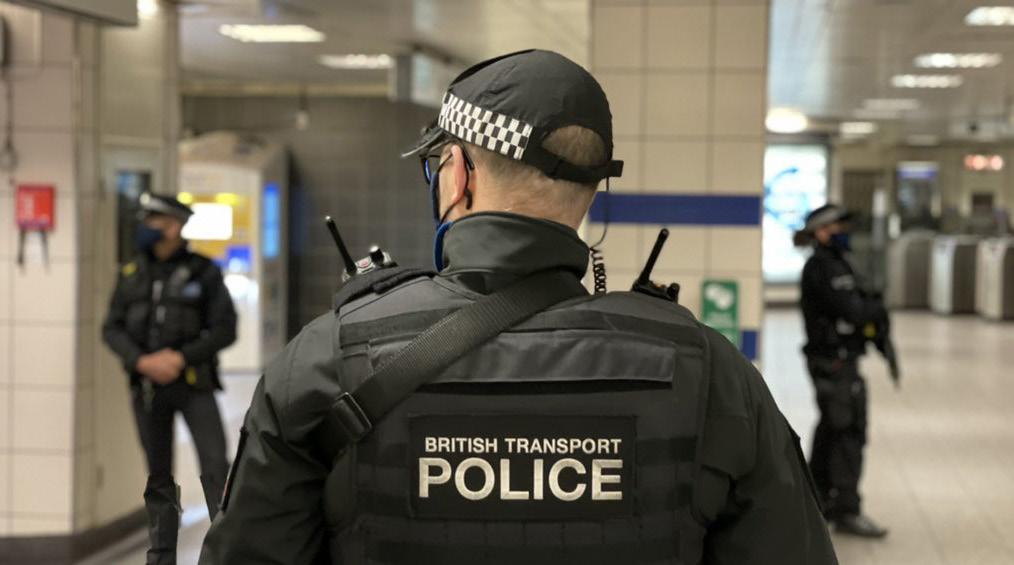
3 minute read
FIVE YEARS OF PROJECT SERVATOR ACROSS ENGLAND, SCOTLAND AND WALES
International transport hubs, such as airports and major train stations, unfortunately have been, and continue to be, a key target for acts of vehicle-related terrorism.
British Transport Police (BTP) polices Britain’s railways, working with rail operators to ensure the safety of the 8.6 million passengers who use the network every day. The force also polices networks such as the London Underground, Midland Metro tram system and Glasgow subway.
Much in the news again lately because of the ongoing inquiry into the attack, BTP officers were the first emergency responders to arrive following the Manchester Arena attacks in May 2017, providing life-saving care to the injured and making the area safe for other emergency services. It is also worth noting that a BTP officer, PC Wayne Marques, was seriously injured as he attempted to protect members of the public during the London Bridge attack, while the force’s armed officers formed part of the specialist response to that incident, working alongside members of the Metropolitan Police and City of London Police.
BTP’s counter terrorism activities also include providing awareness training for staff members from the rail industry and associated businesses. Under the ACT-Action Counters Terrorism banner, the programme is delivered at locations across the country, and aims to equip individuals to detect, deter and report terrorist activity. The sessions cover topics such as possible methods of attack and how to recognise terrorist reconnaissance, while also aiming to build effective working relationships between rail staff and BTP officers, empowering people to report suspicious activity. In particular, rail staff members are told to be aware of people who may be showing interest in restricted areas or appear to be checking security arrangements, for example filming CCTV cameras at a station, or avoiding rail staff and police officers.

PROJECT SERVATOR
BTP officers continue to play an important role in Project Servator, an initiative that was initially set up by the City of London Police (in February 2014) and introduced by BTP in November 2015. Project Servator deployments are unpredictable and designed to be highly visible. Their aim is to make the rail network an uncomfortable place for criminals to operate, while simultaneously reassuring
members of the public and rail staff. Operations use high-profile techniques such as officers in uniform and hi-vis clothing, in addition to search dogs and armed police. They are intended to appear unpredictable in terms of where and when they take place and can happen anywhere and at any time.
Deployments involve officers who are specially trained in identifying criminality. In particular, Project Servator officers will be looking for anyone who might be carrying out hostile reconnaissance or who may have other malicious intent. Hostile reconnaissance can be defined as the purposeful observation of people, places, vehicles and locations, with the intention of collecting information to inform the planning of a hostile act against a target.
Criminals, whether extreme protest groups, organised crime groups or terrorists, have to conduct hostile reconnaissance in order to plan a successful attack. Project Servator patrols aim to disrupt and deter them at an early stage, with the intention they will abandon their plans. Tactics such as these help to create an enhanced and strategic approach to protecting the critical national infrastructure and are part of BTP’s drive to deploy its resources more effectively.
Project Servator is a standardised and consistent approach across many UK Police Services to disrupt, detect and deter terrorism, and all crime types during the act and during the planning stages. This is achieved by completing unpredictable and highly visible deployments using an agreed engagement method.

FIVE YEARS ON
In December 2020, British Transport Police celebrated the fifth anniversary of Project Servator deployments across the rail network. Since the launch in 2015 there have been almost 650 arrests as a result of Project Servator deployments across England, Scotland and Wales, which have seen everything from knives and drugs to stolen goods and wanted criminals being taken off the streets.
Superintendent Sandra England said: “We are delighted to be celebrating five years of Project Servator at British Transport Police this month. Project Servator deployments are vital in creating a network of vigilance and a difficult environment for terrorists considering their targets and individuals looking to commit crime.
“Everyone that uses and works across our rail network has a vital role to play in being our eyes and ears, and I would like to thank the public for their continued support in reporting things that don’t feel right to them. If you see us out and about, come and say hello and find out more about the work we are doing to keep you safe.”
FURTHER INFORMATION
www.btp.police.uk








